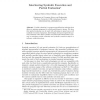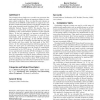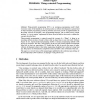661 search results - page 27 / 133 » What Can We Expect from Program Verification |
FMCO
2009
Springer
13 years 6 months ago
2009
Springer
Partial evaluation is a program specialization technique that allows to optimize programs for which partial input is known. We show that partial evaluation can be used with advanta...
ADC
2004
Springer
14 years 2 months ago
2004
Springer
XML is becoming the dominant standard for representing and exchanging data on the World Wide Web. The ability to transform and present data in XML is crucial and XSLT (Extensible ...
VLDB
1998
ACM
14 years 25 days ago
1998
ACM
Data warehouses collect data into materialized views for analysis. After some time, some of the data may no longer be needed or may not be of interest. In this paper, we handle th...
CORR
2010
Springer
13 years 8 months ago
2010
Springer
The transition from single-core to multi-core processors has made multi-threaded software an important subject in computer aided verification. Here, we describe and evaluate an ex...
JIT
2004
Springer
14 years 2 months ago
2004
Springer
Thing-oriented programming (TP) is an emerging programming model which overcomes some of the limitations of current practice in software development in general and of object-orient...



